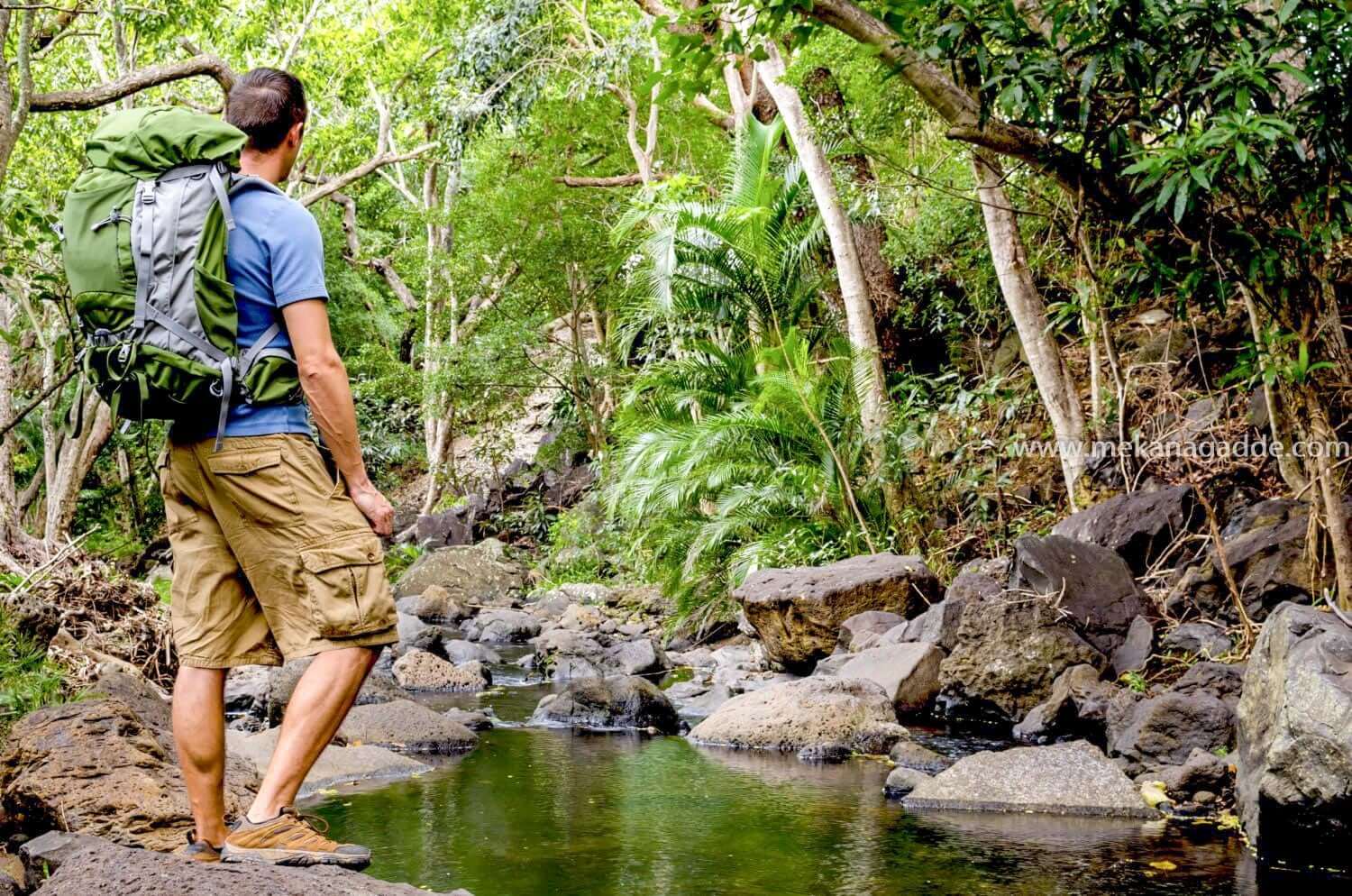Ecological tourism, an increasingly popular form of travel, offers a unique blend of adventure, conservation, and community engagement. By embracing its principles and best practices, we can unlock its transformative potential for both nature and local livelihoods.
This responsible approach to tourism goes beyond mere sightseeing, delving into the intricate relationship between humans and their environment. It empowers local communities, fosters environmental stewardship, and provides a sustainable economic model for conservation.
Definition and Scope of Ecological Tourism

Ecological tourism, or ecotourism, is a responsible form of tourism that focuses on conserving the environment and supporting sustainable practices. It involves traveling to natural areas to appreciate and learn about the unique ecosystems and wildlife while minimizing negative impacts on the environment.
Key characteristics of ecotourism include:
- Minimizing environmental impact through responsible practices and conservation efforts.
- Supporting local communities and promoting cultural exchange.
- Educating visitors about the importance of conservation and environmental protection.
- Generating economic benefits for local communities while preserving natural resources.
Distinction from Other Forms of Tourism
Ecotourism differs from other forms of tourism in several ways:
- Focus on Conservation:Ecotourism prioritizes the preservation and protection of natural environments, while other forms of tourism may focus solely on recreation or entertainment.
- Educational Value:Ecotourism aims to educate visitors about the importance of biodiversity, ecology, and environmental issues.
- Local Involvement:Ecotourism actively involves local communities in planning and managing tourism activities, ensuring that they benefit from tourism while protecting their cultural heritage.
- Sustainability:Ecotourism emphasizes sustainable practices, such as using renewable energy sources, minimizing waste, and respecting local customs and traditions.
Benefits of Ecological Tourism
Ecological tourism offers a myriad of benefits that extend beyond the economic realm. It serves as a catalyst for environmental conservation, fostering social and cultural empowerment while preserving the delicate balance of our ecosystems.
Economic Benefits
Ecological tourism injects financial vitality into local communities. It creates employment opportunities for tour guides, conservationists, and hospitality staff, providing a sustainable source of income for marginalized populations. Moreover, it supports local businesses such as restaurants, transportation providers, and artisans, contributing to economic growth and reducing poverty.
Environmental Benefits
By promoting responsible travel practices, ecological tourism contributes to the preservation of biodiversity and natural habitats. It fosters conservation efforts, protecting endangered species and their ecosystems. Additionally, it educates tourists about the importance of responsible environmental stewardship, instilling an appreciation for the delicate balance of our planet.
Ecological tourism is a form of sustainable tourism that focuses on preserving the environment and promoting cultural understanding. It involves traveling to natural areas and engaging in activities that have a minimal impact on the ecosystem. Eco tourism is about respecting the environment and supporting local communities.
It allows travelers to experience the beauty of nature while also contributing to its conservation.
Social and Cultural Benefits, Ecological tourism
Ecological tourism empowers local communities by providing them with a platform to share their cultural heritage and traditions with visitors. It promotes cross-cultural understanding, breaking down stereotypes and fostering respect for diversity. Moreover, it supports education initiatives, providing opportunities for locals to learn about conservation, environmental sustainability, and tourism management.
Challenges and Best Practices
Ecological tourism presents various challenges, including managing visitor impact on sensitive ecosystems and balancing economic benefits with environmental conservation. To mitigate these challenges, best practices are essential.
Ecological tourism is a form of responsible travel that minimizes negative impacts on the environment and supports local communities. By embracing sustainable travel and tourism practices, travelers can help protect and preserve natural habitats while enjoying the beauty of the planet.
Ecological tourism promotes conservation efforts and raises awareness about the importance of responsible travel, fostering a greater appreciation for the environment and its inhabitants.
Minimizing Environmental and Social Impacts
Minimizing environmental and social impacts requires careful planning and management. Operators should implement measures such as:
- Limiting visitor numbers to prevent overcrowding.
- Establishing designated trails and boardwalks to guide visitors and protect fragile habitats.
- Providing interpretive materials and guides to educate visitors about the ecosystem and its importance.
- Implementing waste management and recycling programs to reduce environmental pollution.
- Respecting local cultures and customs, and involving local communities in tourism planning.
Certification and Accreditation Programs
Certification and accreditation programs provide a framework for operators to demonstrate their commitment to sustainability and ethical practices. These programs establish standards for environmental management, social responsibility, and visitor education.By obtaining certification, operators can:
- Enhance their credibility and attract environmentally conscious tourists.
- Gain recognition for their efforts in sustainable tourism.
- Access training and support to improve their operations.
- Contribute to the development of industry best practices.
Some reputable certification and accreditation programs include:
- Green Globe
- Rainforest Alliance
- Global Sustainable Tourism Council (GSTC)
Case Studies and Examples

Ecological tourism initiatives worldwide have demonstrated remarkable success, contributing to conservation efforts, economic development, and community empowerment. Here are some notable examples:
Table of Successful Ecological Tourism Initiatives
| Initiative | Location | Success Factors |
|---|---|---|
| Tortuguero National Park | Costa Rica | Strict regulations, community involvement, revenue sharing |
| Great Barrier Reef | Australia | Sustainable tourism practices, conservation research, local partnerships |
| Galapagos Islands | Ecuador | Strict visitor limits, guided tours, environmental education |
| Masai Mara National Reserve | Kenya | Community-based tourism, cultural preservation, wildlife conservation |
| Tambopata National Reserve | Peru | Ecotourism lodges, canopy walks, wildlife viewing |
Positive Impacts on Local Communities and Ecosystems
Ecological tourism has brought numerous benefits to local communities and ecosystems:
- Economic empowerment:Tourism revenue supports local businesses, creates jobs, and improves livelihoods.
- Community development:Tourism projects invest in infrastructure, education, and healthcare.
- Cultural preservation:Tourism helps preserve traditional practices, languages, and heritage.
- Conservation:Tourism fees contribute to conservation efforts, protecting wildlife and habitats.
- Education:Tourism provides opportunities for environmental awareness and appreciation.
Case Study: Tortuguero National Park, Costa Rica
Tortuguero National Park, renowned for its nesting sea turtles, has successfully implemented ecological tourism practices. Strict regulations limit visitor numbers, while community involvement ensures local ownership. Revenue sharing provides incentives for conservation and sustainable practices. As a result, Tortuguero has preserved its biodiversity while generating economic benefits for the local community.
Future Trends and Innovations
Ecological tourism is constantly evolving, with new trends and innovations emerging to enhance sustainability and visitor experiences. These advancements are shaping the future of the industry, driving responsible practices and fostering conservation efforts.
One of the key trends is the rise of responsible wildlife tourism. This approach emphasizes ethical interactions with wildlife, prioritizing animal welfare and minimizing disturbance to their natural habitats. Operators are adopting non-invasive techniques, such as remote observation and eco-friendly transportation, to ensure minimal impact on wildlife.
Technology and Sustainability
Technology is playing a vital role in enhancing sustainability and visitor experiences in ecological tourism. Mobile applications provide real-time information on wildlife sightings, trail conditions, and conservation initiatives. Virtual reality and augmented reality experiences allow visitors to immerse themselves in the natural environment without causing physical disturbances.
Innovative Approaches to Conservation and Community Development
Ecological tourism is also driving innovative approaches to conservation and community development. Community-based tourism models empower local communities to manage and benefit from tourism activities. This ensures that tourism revenue stays within the community, supporting sustainable development and preserving cultural heritage.
Conservation organizations are collaborating with tourism operators to develop innovative programs that fund conservation efforts. For example, some tourism companies donate a portion of their profits to wildlife research and habitat restoration projects.
Last Word: Ecological Tourism
As ecological tourism continues to evolve, it presents a beacon of hope for preserving our planet’s natural treasures while empowering local communities. By embracing its guiding principles and adopting best practices, we can ensure that this form of travel remains a force for good, creating a lasting legacy for generations to come.
Helpful Answers
What is the key difference between ecotourism and other forms of tourism?
Ecotourism prioritizes environmental conservation, local community involvement, and sustainable practices, distinguishing it from mass tourism’s focus on maximizing profits and visitor numbers.
How does ecological tourism contribute to local economies?
By creating jobs, supporting local businesses, and promoting traditional crafts and cultural experiences, ecological tourism generates income for local communities, fostering economic growth and reducing poverty.
What are some challenges associated with ecological tourism?
Managing visitor impact, ensuring equitable benefit sharing, and preventing greenwashing are some of the challenges that need to be addressed to maintain the integrity of ecological tourism.
